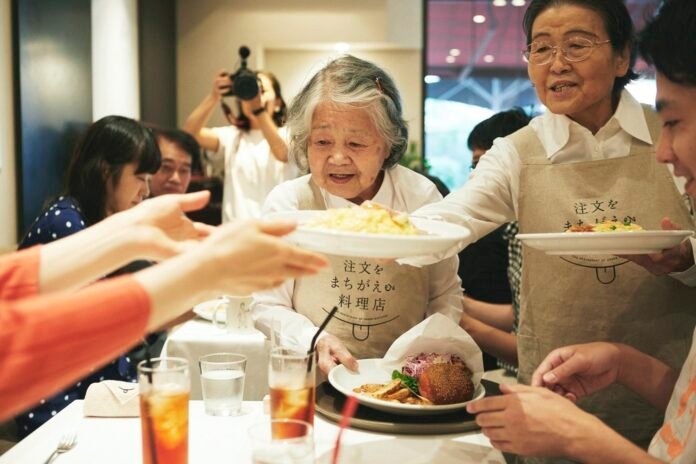
Vaidehi Bhargava
In Japan, often referred to as a super-aging society, it is anticipated that by 2025, one in five individuals will be affected by dementia. In this context, an extraordinary social experiment has captured the imagination of both Japan and the global community.
Welcome to the “Restaurant of Mistaken Orders,” a dining experience where the waitstaff, all of whom live with varying degrees of cognitive impairment, sometimes deliver orders that don’t quite match what was requested. The inspiration for this unique pop-up restaurant arose from a meeting between its creator, Shiro Oguni, and residents of a group home for people with dementia. Oguni reflects, “Like many, my initial perception of dementia was dominated by negative stereotypes—images of individuals who were ‘hopelessly forgetful’ or ‘wandering aimlessly.’ But in reality, they can cook, clean, shop, and do many ‘normal’ tasks. Up close, they may occasionally veer off track, but…”
At lunchtime, Oguni ordered a hamburger steak but was instead served a plate of gyoza. “Seeing everyone around me eating with such enthusiasm, I felt unsure—was it I who had made the mistake?” Oguni recalls. “Why fuss over the difference between a sizzling steak and gyoza? ‘So it’s a mistake, well, that’s fine.’ With that kind of openness, the dining experience transforms into something relaxed and joyous.”
Thanks to the efforts of many, the “Restaurant of Mistaken Orders” has become a place where imperfections are expected and even embraced. An elderly woman might lead guests to a table, only to join them in their seats. Another might serve hot coffee with a straw. One struggles to twist a pepper mill, uncertain if the seasoning will land where intended. In each case, the diners eagerly lend a hand, and laughter follows each small success. However, as Oguni emphasizes, “The point isn’t whether the orders are right or wrong. What truly matters is the interaction with people living with dementia.”
Though initially concerned about potential backlash—criticisms such as, “Don’t turn dementia into a spectacle!”—Oguni was heartened to see how guests reacted. They weren’t laughing at the staff but with them. The joy and pride of the servers—who often say things like, “I’m still capable. This gave me confidence”—shift the negative narrative around dementia to one of warmth and possibility. Oguni notes, “Calling someone ‘the demented Mrs. Whozit’ is very different from ‘Mrs. Whozit, who has dementia.’ Dementia is just a part of who they are, not the whole person. The change must come from society, not from them.”
Oguni envisions not only a “Cool Japan” but also a “Warm Japan”—a nation that fosters kindness and inclusion, where people leave with both smiles on their faces and warmth in their hearts.

